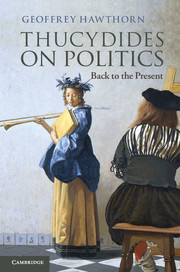Book contents
- Frontmatter
- Dedication
- Contents
- Preface and acknowledgements
- Chronology 545–323 BC
- List of maps
- Maps
- 1 The text
- 2 Writing power: Athens in Greece 478–435
- 3 Explaining the war: stated reasons 435–432
- 4 Explaining the war: true reasons 432
- 5 Judgements 431–430
- 6 Absent strategies 430–428
- 7 Speech and other events 428–427
- 8 Meaning and opportunity 426–424
- 9 Necessities 424
- 10 Interests 423–421
- 11 Emotion in deed 420–416
- 12 Purposes and decisions 415
- 13 Character and circumstance 414–413
- 14 One war 413–411
- 15 Back to the present
- Synopsis of the text by book and year
- Further reading
- References
- Index
7 - Speech and other events 428–427
Published online by Cambridge University Press: 05 June 2014
- Frontmatter
- Dedication
- Contents
- Preface and acknowledgements
- Chronology 545–323 BC
- List of maps
- Maps
- 1 The text
- 2 Writing power: Athens in Greece 478–435
- 3 Explaining the war: stated reasons 435–432
- 4 Explaining the war: true reasons 432
- 5 Judgements 431–430
- 6 Absent strategies 430–428
- 7 Speech and other events 428–427
- 8 Meaning and opportunity 426–424
- 9 Necessities 424
- 10 Interests 423–421
- 11 Emotion in deed 420–416
- 12 Purposes and decisions 415
- 13 Character and circumstance 414–413
- 14 One war 413–411
- 15 Back to the present
- Synopsis of the text by book and year
- Further reading
- References
- Index
Summary
Thucydides’ set pieces on events in the fourth and fifth years of the war turn on the reaction of one or other of the two warring powers to their allies. A rebellion in the city of Mytilene on Lesbos was indicative of those states who sought to take advantage of the wider conflict to recover their autonomy; a debate in Athens about how to deal with this resistance reveals more clearly than anything else in Thucydides how the Athenians now saw themselves in relation to their dominion. A descent into internal war in Corcyra indicated how the wider war was inciting factions within the lesser Greek cities to gain advantage over each other. And Sparta's decision to destroy Plataea is in good part explained by its wish to please Thebes. Each reveals how fear, frustration and rage in the two large powers were offering opportunities to lesser states that brought suffering on these states themselves. Each also exposes the growing distance between what was said and done. Thucydides writes speech to show what men were thinking and how they wished to persuade others to think and act. He makes it clear that on Plataea and Mytilene, speech had as little impact on what was done as it did in most of the rest of his story. He makes it clear also that the war of words as well as actions in Corcyra, to be repeated, he says, in other internal wars, was one in which those speaking were not actually thinking at all.
- Type
- Chapter
- Information
- Thucydides on PoliticsBack to the Present, pp. 84 - 101Publisher: Cambridge University PressPrint publication year: 2014



